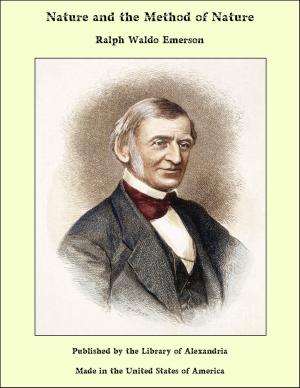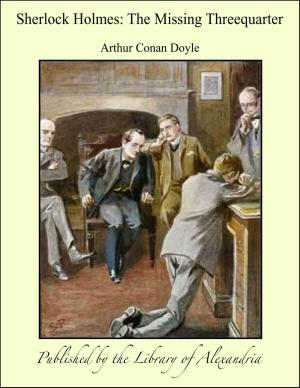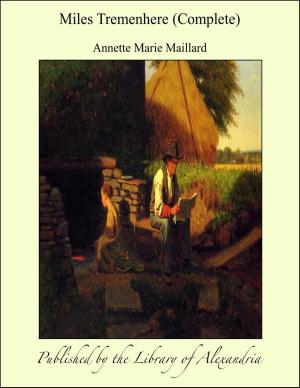| Author: | Margaret Oliphant Wilson Oliphant | ISBN: | 9781465529381 |
| Publisher: | Library of Alexandria | Publication: | March 8, 2015 |
| Imprint: | Language: | English |
| Author: | Margaret Oliphant Wilson Oliphant |
| ISBN: | 9781465529381 |
| Publisher: | Library of Alexandria |
| Publication: | March 8, 2015 |
| Imprint: | |
| Language: | English |
Mr. Tatham was a well-built and vigorous man of five-and-thirty, with health, good behaviour, and well-being in every line of his cheerful countenance and every close curl of his brown hair. His hair was very curly, and helped to give him the cheerful look which was one of his chief characteristics. Nevertheless, when these innocent seeming words, "Do you know the man?" which was more certainly demonstrative of certain facts than had those facts been stated in the fullest detail, met his eye, Mr. Tatham paused and laid down the letter with a start. His ruddy colour paled for the moment, and he felt something which was like the push or poke of a blunt but heavy weapon somewhere in the regions of the heart. For the moment he felt that he could not read any more. "Do you know the man?" He did not even ask what man in the momentary sickness of his heart. Then he said to himself, almost angrily, "Well!" and took up the letter again and read to the end. Well! of course it was a thing that he knew might happen any day, and which he had expected to happen for the last four or five years. It was nothing to him one way or another. Nothing could be more absurd than that a hearty and strong young man in the full tide of his life and with a good breakfast before him should receive a shock from that innocent little letter as if he had been a sentimental woman. But the fact is that he pushed his plate away with an exclamation of disgust and a feeling that everything was bad and uneatable. He drank his tea, though that also became suddenly bad too, full of tannin, like tea that has stood too long, a thing about which John was very particular. He had been half an hour later than usual this morning consequent on having been an hour or two later than usual last night. These things have their reward, and that very speedily; but as for the letter, what could that have to do with the bad toasting of the bacon and the tannin in the tea? "Do you know the man?" There was a sort of covert insult, too, in the phraseology, as if no explanation was needed, as if he must know by instinct what she meant—he who knew nothing about it, who did not know there was a man at all! After a while he began to smile rather cynically to himself. He had got up from the breakfast table, where everything was so bad, and had gone to look out of one of the windows of his pleasant sitting-room. It was in one of the wider ways of the Temple, and looked out upon various houses with a pleasant misty light upon the redness of their old brickwork, and a stretch of green grass and trees, which were scanty in foliage, yet suited very well with the bright morning sun, which was not particularly warm, but looked as if it were a good deal for effect and not so very much for use. That thought floated across his mind with others, and was of the same cynical complexion. It was very well for the sun to shine, making the glistening poplars and plane-trees glow, and warming all the mellow redness of the old houses, but what did he mean by it? No warmth to speak of, only a fictitious gleam—a thing got up for effect. And so was the affectionateness of woman—meaning nothing, only an effect of warmth and geniality, nothing beyond that. As a matter of fact, he reminded himself after a while that he had never wanted anything beyond, neither asked for it, nor wished it. He had no desire to change the conditions of his life: women never rested till they had done so, manufacturing a new event, whatever it might be, pleased even when they were not pleased, to have a novelty to announce. That, no doubt, was the state of mind in which the lady who called herself his aunt was: pleased to have something to tell him, to fire off her big guns in his face, even though she was not at all pleased with the event itself. But John Tatham, on the other hand, had desired nothing to happen; things were very well as they were.
Mr. Tatham was a well-built and vigorous man of five-and-thirty, with health, good behaviour, and well-being in every line of his cheerful countenance and every close curl of his brown hair. His hair was very curly, and helped to give him the cheerful look which was one of his chief characteristics. Nevertheless, when these innocent seeming words, "Do you know the man?" which was more certainly demonstrative of certain facts than had those facts been stated in the fullest detail, met his eye, Mr. Tatham paused and laid down the letter with a start. His ruddy colour paled for the moment, and he felt something which was like the push or poke of a blunt but heavy weapon somewhere in the regions of the heart. For the moment he felt that he could not read any more. "Do you know the man?" He did not even ask what man in the momentary sickness of his heart. Then he said to himself, almost angrily, "Well!" and took up the letter again and read to the end. Well! of course it was a thing that he knew might happen any day, and which he had expected to happen for the last four or five years. It was nothing to him one way or another. Nothing could be more absurd than that a hearty and strong young man in the full tide of his life and with a good breakfast before him should receive a shock from that innocent little letter as if he had been a sentimental woman. But the fact is that he pushed his plate away with an exclamation of disgust and a feeling that everything was bad and uneatable. He drank his tea, though that also became suddenly bad too, full of tannin, like tea that has stood too long, a thing about which John was very particular. He had been half an hour later than usual this morning consequent on having been an hour or two later than usual last night. These things have their reward, and that very speedily; but as for the letter, what could that have to do with the bad toasting of the bacon and the tannin in the tea? "Do you know the man?" There was a sort of covert insult, too, in the phraseology, as if no explanation was needed, as if he must know by instinct what she meant—he who knew nothing about it, who did not know there was a man at all! After a while he began to smile rather cynically to himself. He had got up from the breakfast table, where everything was so bad, and had gone to look out of one of the windows of his pleasant sitting-room. It was in one of the wider ways of the Temple, and looked out upon various houses with a pleasant misty light upon the redness of their old brickwork, and a stretch of green grass and trees, which were scanty in foliage, yet suited very well with the bright morning sun, which was not particularly warm, but looked as if it were a good deal for effect and not so very much for use. That thought floated across his mind with others, and was of the same cynical complexion. It was very well for the sun to shine, making the glistening poplars and plane-trees glow, and warming all the mellow redness of the old houses, but what did he mean by it? No warmth to speak of, only a fictitious gleam—a thing got up for effect. And so was the affectionateness of woman—meaning nothing, only an effect of warmth and geniality, nothing beyond that. As a matter of fact, he reminded himself after a while that he had never wanted anything beyond, neither asked for it, nor wished it. He had no desire to change the conditions of his life: women never rested till they had done so, manufacturing a new event, whatever it might be, pleased even when they were not pleased, to have a novelty to announce. That, no doubt, was the state of mind in which the lady who called herself his aunt was: pleased to have something to tell him, to fire off her big guns in his face, even though she was not at all pleased with the event itself. But John Tatham, on the other hand, had desired nothing to happen; things were very well as they were.















